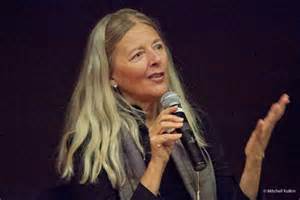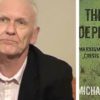053: Helena Norberg-Hodge on Localisation, Trade Treaties and the Economics of Happiness
Helena Norberg-Hodge is the founder and director of Local Futures. A pioneer of the ‘new economy’ movement, she has been promoting an economics of personal, social and ecological well-being for more than 30 years.
Helena is the producer and co-director of the award-winning documentary The Economics of Happiness, and is the author of Ancient Futures: Learning from Ladakh, described as “an inspirational classic”.
Helena has given public lectures in seven languages, and has appeared in broadcast, print, and online media worldwide.
She was honored with the Right Livelihood Award (or ‘Alternative Nobel Prize’) for her groundbreaking work in Ladakh, and received the 2012 Goi Peace Prize for contributing to “the revitalization of cultural and biological diversity, and the strengthening of local communities and economies worldwide”.
Economics:
In this interview, Helena mentions: localisation, globalisation, deregulation, finance, banking, money, real economy, price, demand, subsidies, tax, business alliances, lobbying, competition, trade treaties, unemployment, poverty, natural environment, growth, climate, energy consumption, comparative advantage and GDP.
Economists:
In this interview, Helena mentions: Alex Tabarrok, Adam Smith, David Riccardo,
In this episode you will learn:
- how and why Helena decided to advocate for and promote localisation.
- about Ladakh and how it was removed from the rest of the world.
- how the global market was very destructive to the local market in Ladakh.
- how globalisation destroyed the livelihood of farms and local businesses and created unemployment.
- how the happiness and high self-esteem among the people of Ladakh was destroyed after a decade of economic development.
- why extreme tensions between buddhists and muslims erupted after living in peace for over 500 years in Ladakh.
- about Ladakh, where the Dalai Lama is the spiritual head.
- how Ladakh has become a case study on how a local economy has been quickly affected by globalisation.
- about the phenomenal work Helena is doing to highlight the changing lives and economy of Ladakh and other regions.
- about the true meaning of the real economy and how cheap money and speculation is destroying it.
- why the earth is so precious and must be protected before we see irreversible and horrific damage.
- about the terrific work being undertaken by Local Futures to highlight the need for economic change to protect our earth.
- why we need to make the local food market a global initiative.
- how small towns and villages are taking initiatives to feed their community with fresh, organic foods.
- how schools are integrating nature into their infrastructure to increase the well-being of staff and pupils.
- how nature provides profound and important psychological healing benefits.
- how diversifying and staying local can provide more diversified foods per unit of land and water than the large monocultures.
- why farmers prefer to work closely with the customer than with large-scale supermarkets.
- whether small farmers and businesses should create a group to represent the their interests and to lobby governments in much the same way as large companies like Volkswagen and Monsanto.
- how to make small and local businesses more visible.
- about Helena’s mantra for resistance and renewal – resisting trade treaties and renewing localisation.
- about the law that was passed in Sweden to have trade treaties to be discussed in secret.
- how, under the new trade agreements, multinational corporations can sue governments if they inhibit their profit-making ability of that governments country.
- whether GDP is a good measure of progress and how Helena interprets its true meaning.
Quotes by Helena on the Economic Rockstar Podcast:
“The EU is essentially an economic union and it’s bringing with it a centralised bureaucracy” – Helena Norberg-Hodge
About Earth Being Our Only Economy:
“The earth is our only economy. There’s nothing we use that doesn’t come from the earth. Nothing, nothing. Every iPad, every shoe, every television. And that economy, the real economy, is diversity. It requires and can only continue to live by respecting the uniqueness of every leaf, of every human being. Everything that lives is unique and is changing from moment to moment.” – Helena Norberg-Hodge
“Usually when people talk about the economy, they’re just thinking about paper money. They don’t think about culture and farming as having anything to do with the economy.” – Helena Norberg-Hodge
“The global food economy, from beginning to end, is the biggest contributor to CO2 emissions, and it’s not just because of the factory farming with animals. It’s across the board.” – Helena Norberg-Hodge
About the Stock Market and Cheap Money:
“The market is really young lads sitting in front of computers speculating with huge amounts of money. And they inevitably have to and do favour the giant. They’re betting on the giants ‘horses’ like Monsanto, McDonalds and Walmart. And so this connection between that flood of cheap money created out of thin air, now has become a sort of a ‘blind machinery’ that is eating up the real economy, the earth, extremely rapidly and we’re going to see more horrific examples.” – Helena Norberg-Hodge
Other Quotes:
GDP is an outrageous measure of progress. It is simply a measure of commercialisation – Helena Norberg-Hodge
With Riccardo and the notion of comparative advantage, it sounds good on the surface. But let’s remember it was brought in in a time of slavery – Helena Norberg-Hodge
Where to Find Helena:
- Local Futures: www.localfutures.org
- Economics of Happiness
Podcast: Play in new window | Download
 035: Stephen Young on Being Car-Free and the Behavioural Economics of Owning A Car
035: Stephen Young on Being Car-Free and the Behavioural Economics of Owning A Car 085: Michael Roberts on Understanding Karl Marx and His Thinking on Capitalism
085: Michael Roberts on Understanding Karl Marx and His Thinking on Capitalism 083: Stephen Kinsella on Stock Flow Models, Rent Controls and Being the Green Lantern of Economics
083: Stephen Kinsella on Stock Flow Models, Rent Controls and Being the Green Lantern of Economics 069: Diane Coyle on GDP, Its Shortcomings and Alternative Measures
069: Diane Coyle on GDP, Its Shortcomings and Alternative Measures 006: Andrew Heaton on Using Comedy to Explain Economic Concepts
006: Andrew Heaton on Using Comedy to Explain Economic Concepts 000: About Economic Rockstar
000: About Economic Rockstar 041: Dermot Hayes on Comparative Advantage, Feeding the Chinese and the Malthusian Catastrophe
041: Dermot Hayes on Comparative Advantage, Feeding the Chinese and the Malthusian Catastrophe 073: Robin Hanson on The Age of Em and How Brain Emulations Will Double Economic Growth Every Month
073: Robin Hanson on The Age of Em and How Brain Emulations Will Double Economic Growth Every Month Conor McGregor is Homo Economicus: I’m Going To Whoop His Ass
Conor McGregor is Homo Economicus: I’m Going To Whoop His Ass 086: Philip Pilkington on Determinism and the Reformation in Economics
086: Philip Pilkington on Determinism and the Reformation in Economics
 David Zetland
David Zetland
October 27, 2015 at 10:40 pmInteresting interview, and I agree with 80 percent of it (especially the need to reduce subsidies and systems of crony capitalism). I disagree with her assertion that local economies will grow and thrive while people are interested in more and cheaper consumption. Can they turn away from that? Perhaps an end to advertising would help, but there’s still that basic desire for more.
Perhaps it’s an ironic twist, but I think the best chance for returning to “small is beautiful” lies in the commodification of white collar jobs, so that people need to find new ways of making money as well as living with less. The new supply side, if you will.